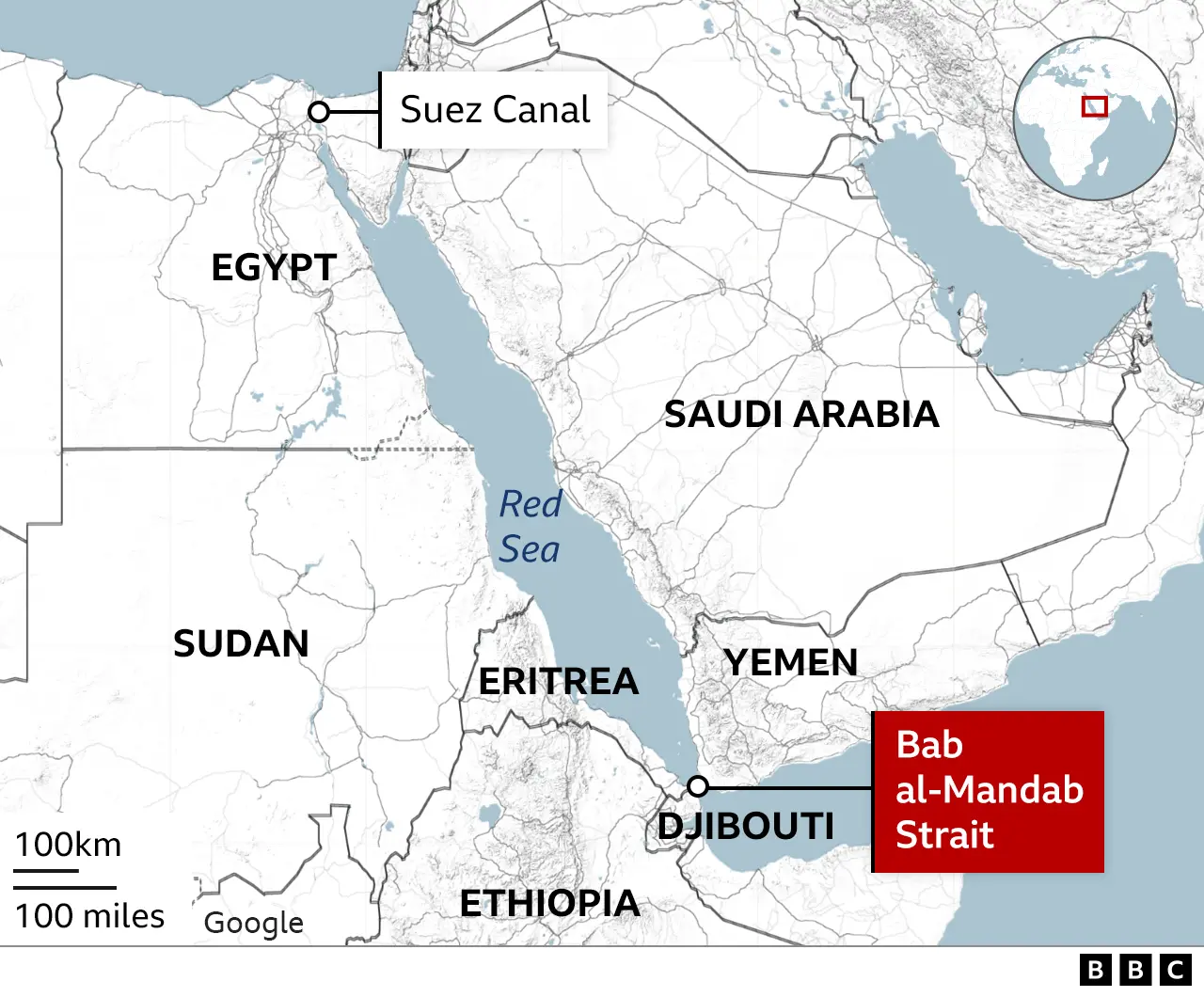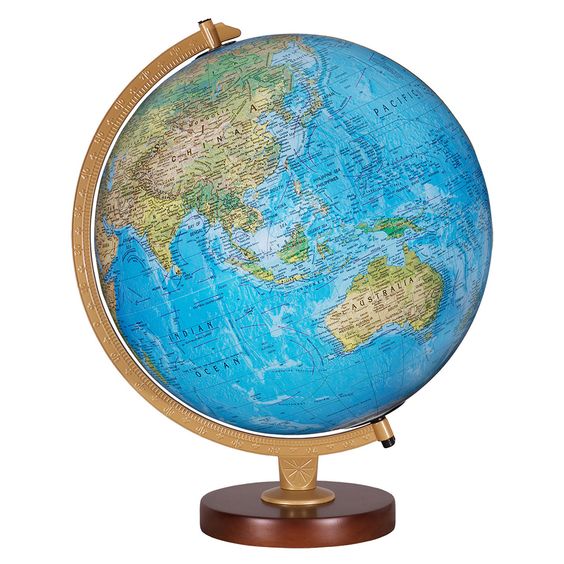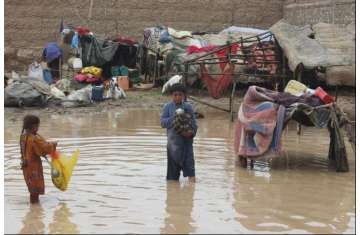Who are the Houthis and why are they attacking the world’s shipping?
Since the start of November the Houthis of Yemen have launched more than 20 attacks on shipping in the Red Sea.
Nearly 15 Percent of the world’s trade passes through the Red Sea. Already 20 percent of the ships have been diverted around South Africa, adding to transport costs and inflation. Those ship owners who continue to sail through the Red Sea are faced with rocketing insurance bills.
NATO ships have rushed to the region and the Houthis have been warned of terrible consequences if they continue their strikes.

So, who are the Houthis and why are they attacking the world’s shipping?
The answer to why is easy—Gaza. The Houthis hate Israel, Saudi Arabia and the US, and they are supporters of the Palestinian cause. The Houthi motto is: “Death to America. Death to Israel.”
The ‘who’ is slightly more complicated – For a start they are Shia Muslims which gives them a link to Iran. But, just to complicate matters, they are a different Shia sect known as the Zaydis. But shades of religious difference have not prevented an alliance between the Houthis and Tehran.
Next, the Houthis make up about 40 percent of the population of Yemen. Until about 1967 they were Yemen’s ruling elite for close to a 1,000 years.
It was about 1967 that the Saudis started using their oil money to interfere in Yemeni politics. The Saudi ruling family are Sunni and they have a problem with dissatisfied Shias in their Eastern Province along the border with Yemen.
The Saudis engineered the installation of a Sunni government in the capital of Sanaa and gradually the Houthis were eased out of jobs and positions of authority. By 1990 the Houthis were starting to form rebel cells and in 2014 a full-scale civil war broke out when they marched into and occupied Sanaa.
For eight years fighting raged between the Houthi rebels and Sunni government backed by Saudi Arabia. The Houthis secured the support of Iran because they were Shias and because Iran and Saudi Arabia had strained relations. Some 150,000 people have died in the fighting. Four times that number have been wounded and crippled for life. Another 250,000, according to UN relief agencies, have died from famine or disease directly related to the war.
The Saudis spearheaded the war effort against the Houthis with blockades and indiscriminate air attacks. They were supported by Qatar, Jordan, Bahrain and the UAE. Also lending a hand with weaponry and intelligence were the US and UK.
But after the election of Joe Biden, Washington changed course and pressured the Saudis to ease up. Biden was not pro-Houthi. He was less pro-Saudi and anti the bad publicity being generated by the Saudi bombing campaigns.
The result was a successful Houthi offensive which has left them in control of two-thirds of Yemeni territory and the de facto ruler. Last April the Saudis agreed to a ceasefire which has so far held and diplomatic relations have been established between Saudi Arabia and Iran.
The Houthis, however, are now sitting on a massive stockpile of drones, missiles, helicopters, gunboats, etcetera—all provided by Iran over the past decade.
Tehran denies that the Houthis are their proxies, or that they armed them. On the contrary, several Iranian ships bound for Aden have been stopped and found crammed with weapons.
But just how closely tied they are to Iran is arguable. The Houthis have a distinct grievance and national cause and a cultural-religious link with Iran. Iran and the Houthis also have the common enemy of Saudi Arabia. The Iranians have provided the Houthis with arms to pursue their cause. Whether or not that makes them proxies is open to debate.
It is also not known whether the attacks on Red Sea shipping are at the behest of Tehran, approved of by Tehran or the actions of a de facto state flexing its muscles in a popular cause. Iran claims that the Houthi attacks have nothing to do with them.
The West has the capability to eliminate the threat to Red Sea shipping in a matter of days. They have only to destroy the bases from which the Houthis are launching their missiles, helicopters and gunboats. But what would be the Iranian response? What would be the impact on the Yemeni ceasefire? Would the price of free passage through the Red Sea bring Iran racing to the aid of the Houthis and widen the Middle East War?

“The Day after Gaza” – as the discussion about what to do after the fighting is called in Israel, is the number one topic in the Israeli cabinet.
Not surprisingly, the coalition government is hopelessly divided.
On the far-right side are the representatives of the Ultra-Orthodox parties led by Finance Minister Bezalel Smotrich and National Security Minister Itamar Ben-Gvir. They want to “encourage” the Palestinians to leave the Gaza and replace them with Jewish settlers.
A shade more reasonable is Defense Minister Yoav Gallant who wants Israel to retain overall security control while working with a multi-national force in Gaza. Palestinians would be free to manage day-to-day affairs as long as they did not “commit any hostile actions against Israel.”
Prime Minister Benjamin Netanyahu has yet to officially unveil his ideas in cabinet, but he has written an op-ed in the Wall Street Journal. In it he said he had three goals—destroy Hamas everywhere; demilitarize the Gaza Strip and “deradicalize” Palestinians.
The first goal, presumably involves assassinating Hamas leaders in foreign countries. This has the potential of being construed by the host country as an act of war. It certainly would not help Israel’s image.
As for demilitarization, Gaza is already officially demilitarized. Everyone can see how well that has worked.
The third is new and startling Netanyahu claims that at the root of current problems is a Hamas-controlled education system which has radicalized the Palestinians against Israel. He wants to re-educate or “de-radicalize” Palestinians through a revised educational system. This smacks of the re-education camps of China, the Soviet Union, Vietnam, and Cambodia….
***
2024 will be a big election year. Four billion people in more than 70 countries will be trooping to the polls.
Some of the elections will be a sham. Russia is a prime example. I can predict now that Vladimir Putin will win.
Others are real and important. They include the US, UK, EU, India, South Korea and Mexico. One of the most important and potentially consequential elections occurs next Saturday in Taiwan. The result will determine if the 24million Taiwanese move away from or towards Mainland China.
The voters’ decision will have a major impact on the actions of Xi jinping’s China, and this turn has the potential of dramatic consequences for the rest of the world.
The Taiwanese elections are both presidential and legislative. At the moment both the legislature and the presidency are controlled by the Democratic People’s Party (DPP). The President, Tsai Ing-wen has served two terms and is barred from standing for a third.
President Tsai has used her eight years in office to clearly enunciate her party’s policy on reunification. It is that Taiwan does not need to declare itself independent as it is already such in de facto terms. Furthermore, it will continue down this road.
This policy has been echoed by her successor Lai Ching-te (aka William Lai) who is currently ahead in the opinion polls at 36 percent. But not far behind is the Kuomintang’s Hou Yu-ih at 31 percent. A third party is represented by Ko Wen-joh of the Taiwan People’s Party (TPP). He has 24 percent of the polls.
Both the KMT and the TPP accept what is called the “1992 consensus” which states that there is “One China” without saying whether that China is the People’s Republic or Taiwan. They also want to move Taiwan closer to Mainland China. Beijing favours the KMT and opposes the DPP.
The KMT and TPP announced plans in October for a joint presidential ticket. But talks collapsed over the issue of which party leader was the presidential candidate. If they had conquered their egos than the coalition candidate would be the odds-on favorite.
As it is the electorate seem divided, Opinion polls show that two-thirds of the population think of themselves as Taiwanese rather than Chinese. But an equal number want better relations with the mainland.
At the same time, the DPP has been in power for eight years which means the voters blame them for problems such as power blackouts, housing shortages and slow wage growth.
Meanwhile, Chinese President Xi Jin-ping has been busily interfering. After all, he argues, Taiwan is, in Beijing’s view, part of China. This week he used his New Year’s message to repeat that China and Taiwan “will surely be reunified.” President Tsai replied: “That is up to the voters to decide.”
***
Who would want to be a US Supreme Court Justice?
It is a difficult job at the best times, but the travails of Donald Trump has created a potential lose/lose poisoned chalice legal imbroglio for America’s top judges.
There are at the moment two Trump cases in the Supreme Court inbox. They are both related to Trump’s role and responsibility in the January 6 riots and the election lie.
Case number one is the one brought by Special Counsel Jack Smith which claims that Trump is guilty of insurrection. The case is due to be heard in a Washington DC court but the Trump lawyers have appealed to the Supreme Court that their client is immune from prosecution for any crimes he may have committed as president.
Related to that case is the possibility that the riots cannot be judged an insurrection, but there is very little doubt that attempted to obstruction congressional proceedings. That offense can carry a 20year prison sentence.
The Supreme Court has said it will hear oral arguments in the case in March/April and issue its ruling in June—just in time for the Republication National Convention.
The second case involves the decision of the Colorado Supreme Court and Maine’s Secretary of State to block Trump’s name from appearing on primary election ballots. Their reason: He broke his oath of office to protect the constitution by obstructing the election process and promoting insurrection.
The 14th Amendment specifically says that any official of the United States that breaks his oath of office to become involved in insurrection or in any way supports that insurrection or obstruction of the constitution should be barred from office.
It is possible that the conservative-leaning Supreme Court will find a legal loophole that would allow them to delay a decision that would end Trump’s political career. They are lawyers after all.
But the cases are mounting and an increasing number of them are heading for the imposing courthouse at No. One First Street, Washington DC. If the justices’ rulings eventually favor Trump then the liberal left will accuse the court of political bias and claim that the justice system is broken.
If the Supreme Court rules against Trump then the conservative right will accuse the court of being in league with the “Deep State” and claim that the justice system is broken.
Published under International Cooperation with "Sindh Courier"
 UNICEF: Collapse of healthcare system severely threatens children’s lives in Gaza
UNICEF: Collapse of healthcare system severely threatens children’s lives in Gaza
 UAE to host 2nd PAM Women Parliamentary Forum
UAE to host 2nd PAM Women Parliamentary Forum
 UAE, Egyptian Presidents discuss fraternal ties, regional developments
UAE, Egyptian Presidents discuss fraternal ties, regional developments
 Sharjah’s Faya Palaeolandscape marks 11 years in UNESCO HEADS programme
Sharjah’s Faya Palaeolandscape marks 11 years in UNESCO HEADS programme
 Al Marar leads UAE delegation to 164th session of GCC Ministerial Council Meeting
Al Marar leads UAE delegation to 164th session of GCC Ministerial Council Meeting
 ADGM reports strong Q1 performance
ADGM reports strong Q1 performance
 flydubai becomes first UAE carrier to touch down in Damascus
flydubai becomes first UAE carrier to touch down in Damascus

 UNICEF: Collapse of healthcare system severely threatens children’s lives in Gaza
UNICEF: Collapse of healthcare system severely threatens children’s lives in Gaza
 UAE to host 2nd PAM Women Parliamentary Forum
UAE to host 2nd PAM Women Parliamentary Forum
 UAE, Egyptian Presidents discuss fraternal ties, regional developments
UAE, Egyptian Presidents discuss fraternal ties, regional developments
 Sharjah’s Faya Palaeolandscape marks 11 years in UNESCO HEADS programme
Sharjah’s Faya Palaeolandscape marks 11 years in UNESCO HEADS programme
 Al Marar leads UAE delegation to 164th session of GCC Ministerial Council Meeting
Al Marar leads UAE delegation to 164th session of GCC Ministerial Council Meeting
 ADGM reports strong Q1 performance
ADGM reports strong Q1 performance
 flydubai becomes first UAE carrier to touch down in Damascus
flydubai becomes first UAE carrier to touch down in Damascus













Comments